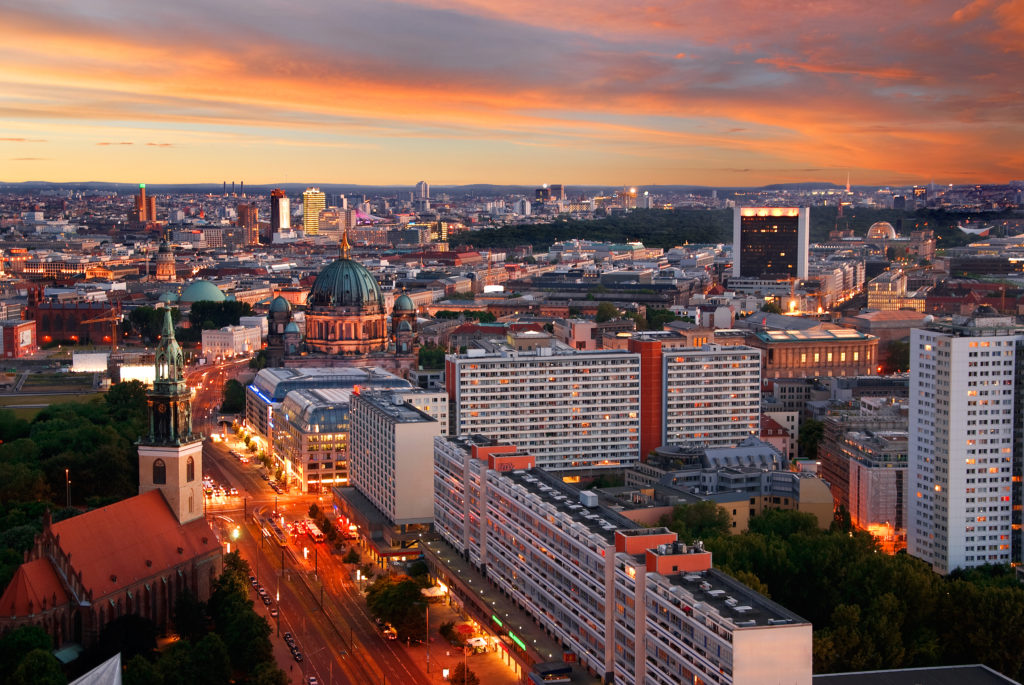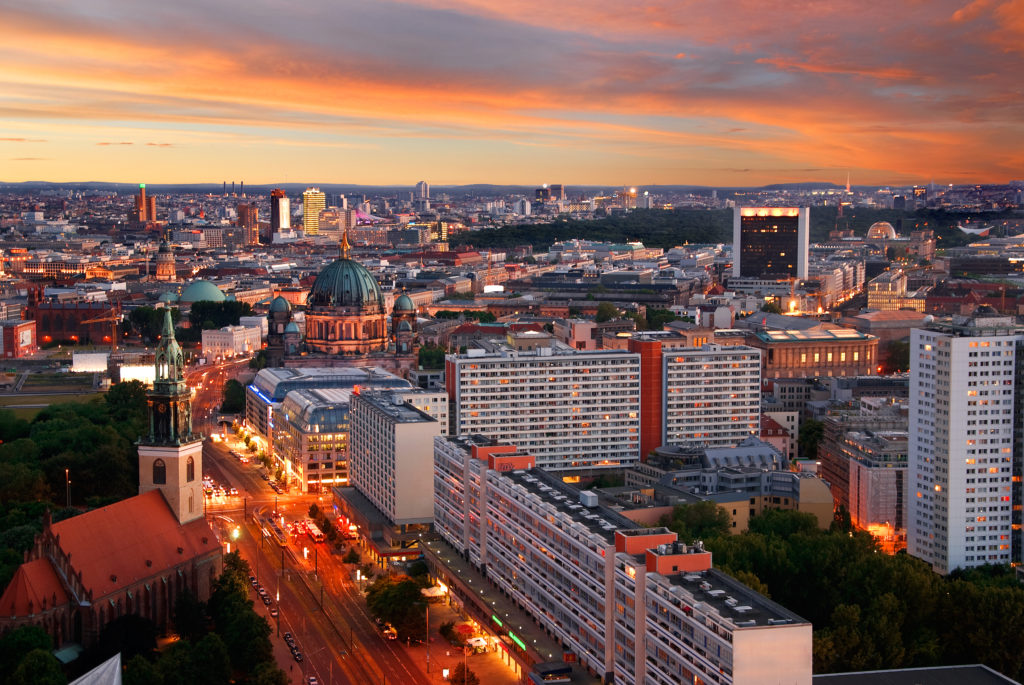
Click here to view Berlin’s Startup Ecosystem Dashboard
Berlin’s diverse startup scene involves over 2.000 startups, with a new startup being founded every 20 minutes. According to McKinsey, the startup ecosystem is expected to create more than 100.000 new jobs by 2020 and they expect Berlin to become Europe’s leading startup hub claiming Europe’s No 1 position from London, having jumped into the top 10 global hot-spots for startups recently. In StartupBlink’s 2019 report, Berlin ranked 1st in Germany and 7th globally.
The more than 2 billion USD that got invested in Berlin during the last two years, more than in all the years prior combined, signify the explosion of international interest for Berlin as startup ecosystem after successful financing and exit rounds by Zalando, Rocket Internet, and recently 6Wunderkinder.
The German Startups Association (@StartupVerband) has recently published that their members alone require over 650 million Euros in growth funding in 2015 alone. Politics and national and international investors are responding. An increasing number of venture capital firms – over 30 on my last count, angel investors and global enterprises, engage in Berlin and provide in concert with many public funding programs fuel to this creative engine, seen as a critical component for future growth and prosperity in Germany and Europe.
A large and growing number and variety of co-working spaces, accelerators, incubators, innovation labs and entrepreneurship programs provide the infrastructure for creative new ideas to flourish and develop into successful new businesses. The German government has highlighted its support for startups in their “High Tech Strategy“, recognizing the importance of startups to 2 support today’s and tomorrow’s needs for R&D to sustain economic wellbeing.
No wonder so many entrepreneurial talents decides to build their future in Berlin. They come from all over the world, 44% of all new entrepreneurs in Berlin are non-German. While Berlin’s unique history provides strong linkages to US, UK, France, and Russia, it’s the location (almost) at the geographical center of Europe literally bridges between west and east, north and south and attracts diverse startup talent from all over the world.
More than 60.000 people work in the digital industry in Berlin, hence software and app startups make the headlines. But the startup scene in Berlin is very diverse with many founders working also in advanced technologies like nanotech, cleantech, biotech, mobility, new media, food, hardware, healthcare, logistics, and especially at the developing intersections of science, technology, arts & culture, and society, like cultural entrepreneurship or fintech.
Berlin’s Startup Success Stories
Who are those founders and startups that make the news? Which products and services developed in Berlin attract investment, grow globally, become the new economy’s favorable brands, or create noticeable exits for their founders?
Zalando: (@Zalando) Online distributor of fashion articles with 2.2 billion Euro annual revenue and about 8.300 employees. Founded in 2008. Zealand has a range of similar international businesses, including Dafiti in Brasil, Lamoda in Russia, Zando in South Africa, and The Iconic in Australia.
Rocket Internet: (@RocketBerlin) Startup incubator founded in 2007, focused on building businesses based on internally successful business models. Active in more than 100 countries predominantly in growth markets. Foodpanda, Lindico, eDarling, Home24 and Zalando are some of their successful brands and businesses. IPO in late 2014
Soundcloud: (@SoundCloud) Online-music service to exchange and distribute audio files with more than 10 million users. Founded 2007, Soundcloud named Technology Pioneers 2013 by World Economic Forum and the founders won the Europioneer Award from the European Commission.
Sociomantic: (@sociomantic) Ad-tech company founded in 2009, bootstrapped without external funding to grow to 200 employees in over 20 locations globally. Acquired by UK’s big data specialist Dunnhumby (owned by Tesco) for a few hundred million Euro in 2014.
6Wunderkinder: (@6Wunderkinder) Developed Wunderlist, a free tasks management SaaS tool. Founded in 2010. Recently acquired by Microsoft for an undisclosed about between 100 and 200 million USD.
Wooga: (@wooga) Developer of social games and mobile games played by 40 million users every month around the world on various platforms. Most popular games include Jelly Splash, Pearl’s Peril, and Diamond Dash. Founded in 2009, now 250 employees from more than 40 countries.
Team Europe: (@TeamEurope) Founded in 2008. Have created and operated multiple successful internet companies including Lieferheld / Delivery Hero, Trivago, and Amiando. The companies Team Europe has co-founded in the past four years have created thousands of jobs.
Babbel: (@babbel) Freemium language learning online platform, operated by Lesson Nine founded in 2007. The app apparently is downloaded up to 120.000 times every day and the business is profitable since 2011. Babel is growing 100% every year, with now 350 employees in Berlin and New York.
Onefootball: (@Onefootball) Founded 2008, with 20million downloads, Onefootball is the world’s most popular online football platform. 60 employees located in Berlin. They come from 25 countries. Watch this space, there are many hopeful candidates positioning for the next big headline about large investment, product success or successful exit.
What makes Berlin such an attractive city for startups?
What’s special about Berlin? Berlin is changing. Like no other European capital, Berlin is in constant transformation. Having gone though a series of political systems over the last century, through a range of styles in architecture and art, fashion, music and film, and through a transformation in business from subsidized industry to developing advanced services, Berlin literally embodies change.
You can see it walking around.
Many national and international films are produced and shot in and around Berlin, carrying the reputation of Germany’s film industry in the early twenties of the last century into the 21 century, thus showcasing today’s Berlin as creative hub with a unique mix of art, culture, technology, entrepreneurship, and every day life. These movies, commercials, TV series and individual clips attract many open minded and resourceful talents from all over the world. Eric Wahlforss (one of the founders of Soundcloud; @ericw) called it “punk meets tech” to express the opportunities provided to “go your own way” when realizing your dreams. It is easy to find like-minded people of all ages to join your startup as mentor, co-founder or employee.
This is especially true for the digital industries where Berlin is the perfect city to try new things, experiment and learn. This unique environment creates a cluster that is unique and strong not only for Germany but in Europe. Entrepreneurs, influencers, lobbyists, customers, investors… all come to Berlin, thus constantly improving the value of the ecosystem. According to a recent study (University of Münster: “Berlins Aufstieg als Finanzzentrum für Venture Capital”) surveying almost 600 venture capital investments in Germany during recent years, almost half were done in Berlin – nearly 900 million Euro, 2/3rds of which in internet services, e-commerce, mobile services and software.
Opportunities are plenty. The fast growing tourism in Berlin creates many chances for startups to find customers from around the world. In 2014, over 12 million tourists form all corners of the world visited Berlin. Once a tourist likes a product or business he had encountered between visiting one of Europe’s largest art collections, historical places, world famous clubs or concert halls, or chilling on a trendy beach club on the river Spree, he/she might order it online or build a new market in his/ her home country.
Startuppers will find a large variety of networks, a broad well educated and trained resource pool, endless opportunities to spend time off work, and a supporting structure that is second to none in Germany. Local governments support startups with a range of special services, including for example an online platform to match ideas with local businesses (marktreif.berlin). Many industry associations are located in Germany’s capital to stay close to and influence political decision making. Most recognize the need for new and fresh ideas and they provide access points for startups and encourage interaction with established businesses.
And one of the most important reasons named over and over by entrepreneurs choosing Berlin, is the cheap cost of living and low cost and ease of starting a business.
What’s holding back Berlin to grow and flourish even more?
Despite the enormous growth of funds into the Berlin startup ecosystem, the numbers are still significantly behind London or Silicon Valley. While the venture capital players, business angels and other investors are coming in increasing numbers to Berlin, funds can still be difficult to get and ambitious entrepreneurs need to find investments internationally if they want to scale and grow on a global scale.
While law makers recognize the need to modernize the investment regulations to enable more private investments, the process is slow and cumbersome. However, with many startup organizations and associates based in Berlin who lobby for improvements, there will be progress towards favorable conditions around for example crowdfunding, banking, and investments.
While the language barrier reduces day by day, with many German and international founders using English as their preferred language to set up shop and work together, there is still a growing need for service providers (lawyers, notaries, marketing agencies, freelancers etc.) to offer their services confidently and in high quality in English and other international languages. Most paperwork is in German too, so international startuppers will need help and support if you don’t speak the language. Which brings me to probably to the most important inhibitor for even stronger growth in the ecosystem: bureaucracy. While concerted efforts and leaps are made to simplify the procedures of founding, provide greater choices of legal structures and creating the fundamentals for startups to flourish, many startuppers are frustrated with the lack of service and attitudes displayed by some local government officials.
Who are the biggest and most important players in Berlin’s ecosystem?
9 out of Germany’s top 10 most important accelerators and incubators are located in Berlin:
Some of the largest companies have started or are about to start innovation laboratories in Berlin. These include Deutsche Bahn, Deutsche Bank, Lufthansa, RWE, and Henkel. Large International companies discover Berlin as a technology hub too. Cisco, for example, is in progress to invest 50 million USD to build one of their technology labs called OpenBerlin (@opnbrln–csco) around the Internet of Things in Berlin. In addition, more than 45 research, co-working and grassroots labs provide valuable connections to some of Germany’s top science and research and development organizations and businesses.
Over 30 venture capital firms, about 170 investment managers and hundreds of business angels are present in Berlin today. Various Crowdfunding platforms support alternative investment opportunities and Berlin’s large banks – some of them have unique financing status and capabilities – provide access to more conventional loans or specific public financing instruments. The largest venture capital firms in Berlin include High Tech Gründerfonds (@HTGF), Point Nine Capital (@PointNineCap), HP Ventures (@pitchhpv), Paua Ventures (@pauaventures), Early Bird VC Management (@EarlybirdVC), b-to-v Partners (@b_to_v), and many others.
A list published late 2014 by the Senat of Berlin shows 45 co-working spaces, since then at least 10 more have opened their doors to provide a work desk and the required infrastructure to founders. The largest and most popular providers of co-working spaces are Factory (@FactoryBerlin), Betahaus (@betahaus), St. Oberholz (@oberholz), Social Impact Lab (@socialimpactlab), and Office Club Berlin Prenzlauer Berg (@officeclubhq). In addition, there are numerous online platforms to search and find a suitable co-working space or office space all over the city. For example Coworking News.
Many entrepreneurship programs are offered by local universities and business schools. The Berlin Startup Academy (@BerlinStartupAc) for example is located at the GTEC (German Technology Entrepreneurship Center; @GTECberlin) and aims to provide startuppers with a mentors network and knowledge around founding and getting funded in Germany. Berlin Geekettes (@BerlinGeekettes) is a community of women in tech providing support and resources (trainings, workshops, networking events) to their members. International organizations and businesses like the Founder Institute (@founding) also offer advice and support for founders in Berlin.
A vast network of available experts, mentors, coaches, specific seminars and workshops is provided for example via free business plan competitions. More than 10.000 founders participated in the last 20 years in BPW (Business Plan Wettbewerb Berlin/Brandenburg; @BPW_wirgruenden) to get support and the chance to win prizes, build networks and gain visibility for their startups ideas.
What are the key Startup events and how do you build effective networks in Berlin?
There are many startup related events in Berlin every day with many providers and platforms to distribute information. Some of the largest startup-related events that attract visitors from around the world are part of Berlin Web Week (@berlinwebweek) and include for example Heureka (@heurekaconf), re:publica15 (@republica) and Things (@thingscon). Popular others are Startup Camp, Tech Open Air (@TOABerlin), Startup Safary (@StartupSafary), deGut (@deGUT), Lange Nacht der Startups (@startupnight) and many others. Every month there is at least one large conference or show relevant for startups in general or in their specified area of interest or industry. A recent trend in Germany’s largest trade show events with global relevance is the inclusion of or focus on new businesses and startups. IFA for example – the world’s leading trade show on consumer electronics and home appliances – provides a range of opportunities to startups (IFA TecWatch; @IFA_Berlin) to present and showcase their products and services to over 200.000 visitors every year.
For international founders and startuppers, Meetup (@Meetup) is a very popular platform to network and find like-minded people, experts and support. Some the most popular Meetup groups are: Startup Berlin (more than 3.500 members), Startup & Investors Group (>700), Startup Grind (>650), Woman Startups & Entrepreneurs Berlin (about 500), and many focused groups like: Lean Startup Berlin (>350), Berlin Future Mobility Meetup (>350) or Discussing EU Funding for Startups & Innovation (>350). These meetups are mostly in English, attract many Internationals and are a great place to start. Also, check out Eventbrite (@eventbrite), quick research showed over 100 upcoming startup related events in the coming months in Berlin.
About the Author
Klaus G. Kammermeier has lived in the UK and US for 10 years, founded Cyoneer GmbH, who advises businesses, organizations and institutions to design their future and operates InnovationLabs.Berlin, the first startup incubator to rent for SME (small and medium-size enterprises). InnovationLabs.Berlin connects startups with established enterprises to realize sustainable businesses. Klaus is a sought after coach and mentor for startups in Berlin and Germany and participates as expert and juror in Germany’s largest business plan/business canvas competitions. He supports students at Beuth University of Applied Sciences and TU Berlin. In a recent project, he works with international startups localizing their offerings for Germany and Europe.








